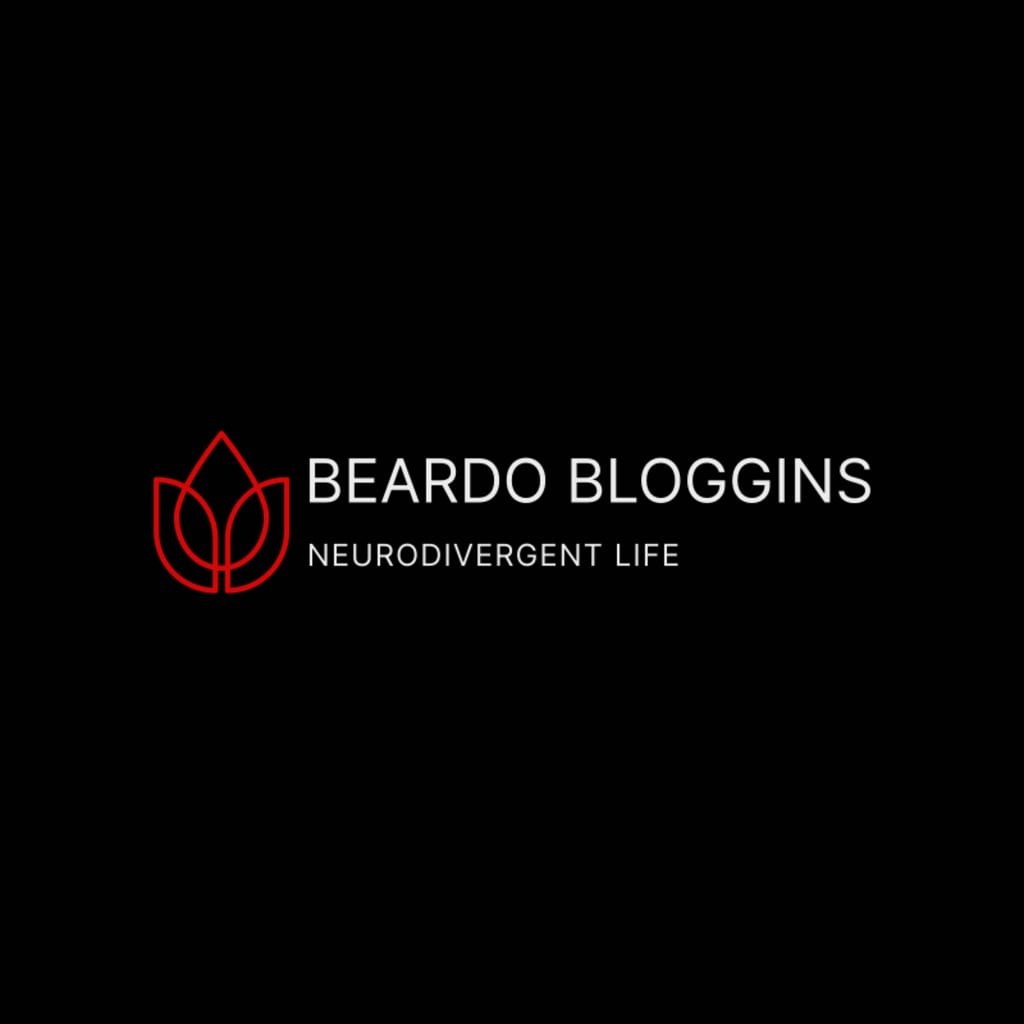Some Questions I Got Asked About Neurodivergent Life
Video Versions Are Going Up on YouTube Too

Recently I started A YouTube channel called Beardo Bloggins after I was diagnosed with ADHD just before Christmas 2022. The point of this channel was to show what life ws like for neurodivergent people as I also have Autism and Dyspraxia. I wanted to show what live was like through my eyes but also educate people on the things we face, but also answer any questions they might have about Autism, ADHD and Dyspraxia. I asked on various social media platform for people to send in their questions and I've included them and the answers below. There will also be video versions available at www.youtube.com/@BeardoBloggins. I would greatly appreciateif anyone has any additional questions they want to know about, The more the merrier as they say!
What is a challenge you faced as a child you wish you had (more) support with?
This is an interesting question, because the more I think about it the more I wonder, did I have any support growing up at all! Autism was still the “new” thing to be diagnosed with, like it seemed like the average person knew next to nothing about. School was a challenge because the infrastructure to help autistic people just didn’t exist. I remember being put in extra English classes as a kid with the dyslexic kids because that’s all there was and that was pretty much the same as no help at all.
I always struggled with verbalising the things I had problems with, I still do to a certain extent. I feel like having someone to just talk to would have been a big help I guess, someone to help learn to verbalise what I was feeling. I always felt like that my problems were too big, and I didn’t want to burden anyone because no one would be able to help me because I couldn’t explain what the issue was there was no point trying to do so.
Having help with opening about things and being encouraged to be myself rather than what neurotypical people wanted me to be and having the outlet or a place where I could do it comfortably.
It’s hard to answer this question fully really because any support would have been good. I feel like this goes for a lot of neurodivergent people too, we’ve all had to wing it, not being able to communicate what we need and going to into a bit of a frustration spiral, to the point where we just bottle up everything because we don’t have the right outlet.
I think peer support can be useful, having other neurodivergent people to talk to and share experiences with can be useful, but even having neurotypical people willing to listen and share hyper-fixations with. I guess being included probably goes a long way too, just having been able to express ourselves in ways that we feel comfortable with and being reassured and being validated.
What are things you think everyone should know about your personal experience with ADHD & Dyspraxia that you feel differs from the stereotypes?
What I don’t think people realise about having Dyspraxia or ADHD, is how hard we as Neurodivergent people must work to fit in. Or how hard it is to present a certain way so that we don’t present the stereotypes either. It is a constant battle too; we supress all our “negative” emotions or behaviours because we don’t want to make neurotypical people uncomfortable. I’m personally new to ADHD having only been diagnosed in November last year. So, I’m still figuring how stereotype could have affected me negatively, most people knew I was autistic, so they explained them away that way. I’m not sure there are enough people that know what dyspraxia is for there to be stereotypes really.
I think neurotypical people don’t realise that we want to be included in things too, we want to be part of the friend group. We want to be involved in the things that you do, but we want you to know that once we’re done, we’re done and we’ll take ourselves away, if we can. I guess I want people to be aware how much energy it requires to do things, but that our energy levels are different every day, and can fluctuate or be recharged.
For ADHD, the main stereotype I feel is that we’re all go all the time and people are unintentionally ignorant of this as well. Not all of us are mega fidgeters or can’t sit still, some of us are inattentive or take a lot of energy to get going but we get something that get us that dopamine fix we sometimes can’t stop.
Every ADHD person is different and presents in various ways, some it’s obvious because we do things that fit the stereotype, but ADHD is a spectrum in it’s one right sometimes and it affects different people based on all sorts of things like age or gender or a person’s environment.
What would be advice/comfort you would give yourself at the ages of 5, 10, and 15?
I suppose the over-arching advice would be “it will get better” which I know is corny and cliché as hell, but I feel like it applies in my case. When I was 5, I was very ill for about 18 months to two years with an autoimmune disease call Henoch Schoenlein which badly effected my kidneys, to the point when I needed part of one of my kidneys removed and blood transfusions and various other unpleasant symptoms. So, I guess I would let 5-year-old me know that I survive, that although it’s going to be hard for a long time, but you’ll get there eventually.
At 10, I had only recently been diagnosed with Dyspraxia, I think I still had questions about myself and life, I would tell myself to keep up the hard work and be communicative, let people know that you’re struggling and stand up for yourself, make sure you’re heard, most people assume that because you’re not kicking up a fuss, or presenting stereotypical neurodivergent traits, that everything is ok.
At 15 I had been diagnosed with Aspergers Syndrome 2 years ago, I was still trying to figure out who I was, I still am, I guess. I felt so out of place, like I wasn’t where I was supposed to be, and I felt so out of control. I was told “Autistic People are good at maths, science, I.T. and puzzle solving, that’s that is what I should be choosing for G.C.S.E.’s and planning as a future career”, I was ok at all those things at 15/16 that I just went with it, even though I wasn’t that interested in it.
My advice for 15-year-old me would be to choose your own path, do what you want to do and again stand your ground. I spent so much time and energy studying things that I wasn’t interested in at all whatsoever, because I thought that would make over people happy. I was told that would be something I would thrive in, my academic record post 16 would probably suggest otherwise.
Also learn to communicate that you’re feeling burnout or what you want to do and why you want to do it, it’s ok to have your own opinions.
What was the most positive thing that has come from your diagnosis?
The diagnosis that has had the biggest positive impact on my life has been my ADHD diagnosis as I’ve said in a previous video there have been so many far-reaching positives in so many aspects of my life that being in the place, I am now, I can achieve things that I’ve been wanting to do for years.
With my Autism and Dyspraxia diagnosis I feel like no-one knew what to do with me really because I’m on the “mild end” of the spectrum. I was very much left to my own devices and had to try and figure it out myself.
What is your favourite go-to for comfort/support during an overwhelming moment?
This might be a strange answer but Metal music and its various sub-genres, that or taking myself away from a scenario and just being by myself for a bit. I don’t know what it is about metal music, it’s sort of cathartic in a way. If I’m having a bad day just listening to the music, helps me calm down.
I suppose you could also say that I probably stress eat too, but I’m working on that, especially now I feel a bit more in control of my life, I feel like I have the capability to do that.
I’ve also started using meditation recently to help, I’ve discovered “Green Noise” which is like white noise but deeper in pitch, it helps turn my brain off or quieten it slightly.
Do you feel properly represented in society/media? If not, what would that look like to you?
No, there so many stereotypes that I feel don’t represent neurodiversity at all and when it does get represented, they get it so wrong or the represent such a narrow view in what it’s like being on the autistic spectrum or having ADHD. I hate the character Sheldon Cooper on the show The Big Bang Theory for this reason, it’s such a caricature of what it’s like to be autistic and he shows very little character development, or how it really is an autistic adult. Sometimes I feel like we kind of get pushed aside in society, no-one really wants to support us because there’s no one solution fits all for neurodivergence. People don’t realise how diverse we are as a group of people, not ever autistic is a nonverbal robot, who can’t show emotion, rocking in the corner playing with model trains of Lego. Not every ADHD person is a fidgety, hyperactive, easily distractable person who operates at a hundred miles an hour.
The biggest help will be for people to listen to us and not immediately dismiss what we’re saying because it doesn’t fit their preconceived notions of us.
What needs do people with ADHD & Dyspraxia have that you would like to see supported in schools/the workplace?
Anything really, ADHD and Dyspraxia is so underrepresented in school and the workplace, especially Dyspraxia. The problem is that because there is no one size fits all approach for neurodivergent people schools, businesses and neurotypical people just don’t invest in putting support in place because bespoke support for us would, most likely, deemed too expensive or unnecessary. So many people told in school or university “use it or lose it” when it came to what little support that they did offer, that more often than not, support was often withdrawn because I didn’t need it all day everyday or it was deemed inappropriate because I “wasn’t autistic enough”. People need to be flexible with their support and it needs to be lead by the person who needs it, rather that, “this is what you get, take it or leave it”.
What types of experiences with ADHD & Dyspraxia are you wanting to share on your platform and why?
I want to share all sorts of experiences on here, the whole point of this platform is for learn from someone who is living them. Of course, I am only one person so I can only offer my own experience of certain things, but I hope I can also put certain general things into some form of context. I want people to come here and learn, sometimes to be entertained, sometimes to see the world from a different perspective. I certainly don’t believe I speak for all neurodivergent people, but I hope to provide one of many perspectives.
What tools, items, types of support, and/or content creators would you recommend to someone just diagnosed?
As far as content creators go, me obviously, is my first choice. I’ve only recently been looking for neurodivergent creators myself really, who focus on being neurodivergent, so I’m still on that journey of discovery. Although I recently discovered Paige Layle, Connor De Wolfe and Jeremy Andrew Davis on TikTok.
I like to use the CALM app to relax and meditate, some people like using fidget toys or spinners, with different tactile surfaces and things to touch.
I’ve not really accessed many tools or support systems in my life so it’s hard to recommend any because people will react differently to one thing or another.
What are common misconceptions that you would like to correct?
That all neurodivergent people are not the same, is probably the big one. Sure, we may have things that we struggle with in common, but two different people will struggle with the same thing in different ways. It’s a bit like saying all neurotypical people are the same.
That all autistic people are good at maths. I was ok at maths at secondary school level. Beyond that I don’t really understand a lot of it. Same goes for science and I.T. really, I have a vague idea about how computers work and what happens in the background while you’re using them but I’m terrible at coding and I certainly wouldn’t know how to maintain the back-end stuff that goes on in the background.
Another autistic one is that we have no emotions or don’t understand them. Some of us have a better grasp on emotions than others and we pick these things up as we grow older. For some emotions are so intense they don’t know to process or regulate them which can be a cause for meltdowns.
For ADHD it’s probably that we’re hyperactive and overly energetic. I have inattentive ADHD so more often that not I’m the opposite most of the time. Yes, there are more than one type of ADHD. That’s probably a separate one.
I suppose on that fits both autism and ADHD is that both affect boys and girls, men and women, children and adults differently. An autistic/ADHD child will develop into a an autistic/ADHD adult and present differently than they would have done as a child.






Comments
There are no comments for this story
Be the first to respond and start the conversation.